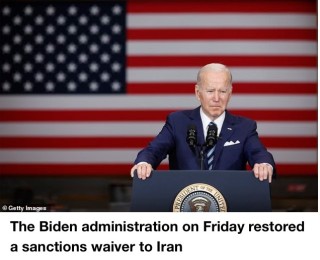Biden REMOVES some Iran sanctions imposed by Trump – including unfreezing $29B in bank accounts overseas
The US State Department is waiving sanctions on Iran’s civilian nuclear program in the hope that Tehran will return to the 2015 nuclear agreement, a senior official said Friday.

As U.S. negotiators head back to Vienna for what could be a make-or-break session, Secretary of State Antony Blinken signed several sanctions waivers related to Iran’s civilian nuclear activities. The move reverses the Trump administration’s decision to rescind them.
The waivers are intended to entice Iran to return to compliance with the 2015 deal that it has been violating since former President Donald Trump withdrew from the agreement in 2018 and re-imposed U.S. sanctions.
The removal of sanctions would see the release of Iran’s frozen funds held abroad, estimated at some $29 billion about a one third of what’s held abroad by the country.
Iran would once against be allowed to trade with the rest of the world use global banking systems such as SWIFT to wire money.
Sanctions against exports of Iranian oil would also be removed. Foreign firms would once again be allowed to invest in Iran’s commodities of oil and gas, automobiles, hotels and other sectors.
So far, three negotiators on the U.S. team have resigned. In January Richard Nephew stepped down as deputy special envoy for Iran and left the U.S. team negotiating Iran’s return to the 2015 nuclear deal because he believed the there was no future for the agreement.
Two other officials have also left the negotiating team in recent months, including Ariane Tabatabai, a senior adviser in the State Department arms control bureau.
Iran says it is not respecting the terms of the deal because the U.S. pulled out of it first. Iran has demanded the restoration of all sanctions relief it was promised under the deal to return to compliance.
Earlier this week it was revealed how Iran’s nuclear program was on the verge of producing enough fuel for a nuclear bomb in just a matter of weeks and could have a device built in less than a year, according to an estimate by US officials.
Iran’s ‘breakout time’ – the time it would take to produce enough weapons-grade uranium for one nuclear weapon – is believed to have advanced greatly after Donald Trump withdrew the US from a deal with the country in 2018, officials claim.
The breakout time is different from the time it would take Iran to build a nuclear weapon. Western officials believe Iran hasn’t quite figured out how to build the core of a bomb and attach a warhead to a missile.
But the reduced breakout time is significantly lower than the 12-month period that formed the basis of the nuclear deal signed by President Barack Obama in 2015.
The length of Iran’s breakout time depends on the steps Iran agrees to take to dismantle, ship abroad, destroy or seal its stockpile of enriched uranium, along with its machines for producing nuclear fuel and its centrifuge manufacturing capacity.
US officials believe a breakout period shorter than six months wouldn’t give the US enough time to respond if Iran decided to ramp up its nuclear program.
The State Department have so far declined to comment on the breakout assessments.
The Trump administration ended the so-called ‘civ-nuke’ waivers in May 2020 as part of its ‘maximum pressure’ campaign against Iran that began when Trump withdrew the U.S. from the deal in 2018, complaining that it was the worst diplomatic agreement ever negotiated and gave Iran a pathway to developing a nuclear bomb.
President Joe Biden made a U.S. return to the nuclear deal a priority, and his administration has pursued that goal but there has been little progress toward that end since he took office a year ago. Administration officials said the waivers were being restored to help push the Vienna negotiations forward.
The waiver allows other countries and companies to participate in Iran’s civilian nuclear program without triggering US sanctions on them, in the name of promoting safety and on-proliferation.
The civilian program includes the country’s increasing stockpiles of enriched uranium.
‘Absent this sanctions waiver, detailed technical discussions with third parties regarding disposition of stockpiles and other activities of nonproliferation value cannot take place,’ the official said, insisting on anonymity.
The step came as talks to restore the 2015 Joint Comprehensive Plan of Action, or JCPOA, which former president Trump unilaterally withdrew from in 2018, were at an advanced stage.
The Vienna talks, which include Iran, the United States, Britain, China, France, Germany and Russia, are at a key stage where the parties have to make ‘critical political decisions,’ a senior US official said last week.


Share your thoughts